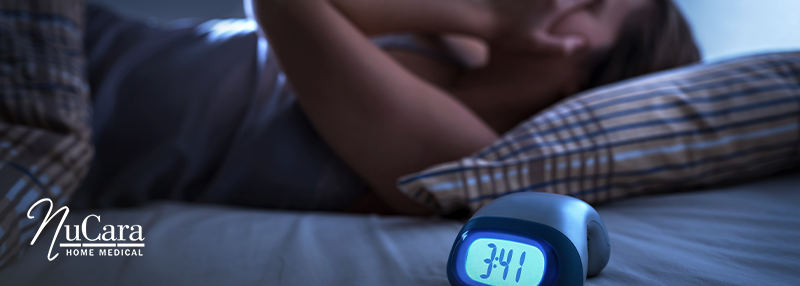NuCara Home Medical
Updated Wed November 26, 2025
Published Under: Sleep Apnea

If you or someone you love has been diagnosed with sleep apnea—or suspects they may have it—you’ve probably come across a lot of information online. The problem? Not all of it is accurate.
At NuCara Home Medical, we talk to people every day who are struggling with sleep apnea or feeling overwhelmed about starting CPAP therapy. Many of them are basing their decisions on common myths that can make sleep apnea seem scarier or more limiting than it really is.
Myth #1: Only older, overweight men get sleep apnea
Truth: Sleep apnea can affect anyone—regardless of age, weight, or gender.
While it’s true that obesity and age are risk factors, sleep apnea is more common and more diverse than many people realize. In fact:
- Women often experience different symptoms, like insomnia, fatigue, or mood changes, and are frequently underdiagnosed.
- Children can also suffer from sleep apnea due to enlarged tonsils or other airway issues.
- Even lean, young individuals can have sleep apnea if they have certain genetic or anatomical factors.
Myth #2: Snoring always means sleep apnea
Truth: Not all snoring is caused by sleep apnea—and not all people with sleep apnea snore.
Snoring happens when airflow causes the tissues in your throat to vibrate. It’s a common symptom of obstructive sleep apnea (OSA), but it’s not a guarantee. Some people with sleep apnea don’t snore at all, while others may snore for reasons unrelated to apnea, such as nasal congestion or sleep position.
Key signs of sleep apnea to watch for:
- Pauses in breathing during sleep (often noticed by a partner)
- Daytime fatigue or brain fog
- Morning headaches
- Waking up choking or gasping
Myth #3: I’d know if I had sleep apnea
Truth: Many people have no idea they stop breathing at night—until someone else tells them or they undergo a sleep study.
Sleep apnea episodes happen while you’re asleep, so unless someone’s watching or recording your sleep, they’re easy to miss. In fact, it’s estimated that millions of people in the U.S. have undiagnosed sleep apnea. You might think you’re sleeping fine, but if you wake up exhausted or feel foggy during the day, it’s worth getting checked out.
Already diagnosed? You have a choice in your care provider. If you’re not getting the support you need, NuCara Home Medical makes it easy to transfer your CPAP therapy to us and get the supplies and service you deserve.
Myth #4: CPAP machines are loud, bulky, and uncomfortable
Truth: Today’s CPAP technology is lighter, quieter, and more comfortable than ever.
Gone are the days of big, noisy machines. Modern CPAP (and APAP) devices are designed to be:
- Compact and travel-friendly
- Whisper-quiet for better sleep
- Customizable with options like full-face masks, nasal masks, nasal pillows, and heated humidifiers
With the right fit and setup, most people find that CPAP therapy actually helps them sleep better—not worse.
Not sure what you need? Our team at NuCara can walk you through your options and help you find the right mask and machine for your lifestyle.
Myth #5: Once you start CPAP therapy, you’re on it forever
Truth: While CPAP is often a long-term treatment, that’s not a bad thing—and some people can reduce their dependence with lifestyle changes or alternative therapies.
Think of CPAP like wearing glasses. It corrects the issue while it’s being used, but doesn’t “cure” the underlying condition. That said, certain people may find that weight loss, surgery, or dental devices reduce or eliminate their need for CPAP—but this is not guaranteed and should only be considered under a doctor’s care.
Even if your symptoms improve, never stop CPAP therapy without speaking to your healthcare provider.
Myth #6: CPAP equipment is hard to maintain
Truth: CPAP care is simple once you get the hang of it—and proper maintenance protects your health and your machine.
Here’s what your routine should look like:
- Daily: Wash your mask and cushion daily using warm, soapy water.
- Weekly: Wash your tubing and humidifier chamber with mild soap and water.
- Every 2-4 weeks: Replace disposable filters (depending on your machine).
- Every 3-6 months: Replace your mask cushion and headgear for a better seal and comfort.
Myth #7: I feel fine, so I must not need treatment
Truth: Sleep apnea can have serious long-term health effects, even if you don’t feel the symptoms right now.
Left untreated, sleep apnea has been linked to:
- High blood pressure
- Heart disease and stroke
- Type 2 diabetes
- Cognitive decline
- Mood disorders and depression
Why Choose NuCara for Sleep Apnea Support?
We know how confusing and overwhelming sleep apnea can feel—especially when you’re sorting through conflicting information. That’s why NuCara Home Medical is here to help with:- Expert guidance on PAP machines and supplies
- A wide range of CPAP masks, filters, sanitizers, and more
- Resupply reminders and fast, easy ordering
- Compassionate, local care from people who understand your journey
Final Thoughts: Don’t Let Sleep Apnea Myths Hold You Back
Whether you’re newly diagnosed or supporting someone you love, understanding the facts about sleep apnea is the first step to better health and better sleep. Don’t let outdated ideas keep you from getting the care you need.
At NuCara Home Medical, we believe you deserve clear information, reliable products, and people who care. Explore our CPAP products today or contact us to learn how easy it is to transfer your care to NuCara.
Comments